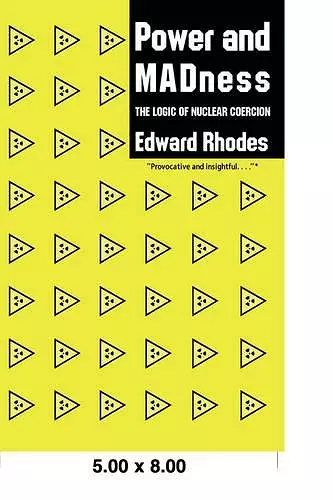Power and Madness
The Logic of Nuclear Coercion
Format:Paperback
Publisher:Columbia University Press
Published:18th Nov '91
Currently unavailable, and unfortunately no date known when it will be back

"Lorrie Goldensohn's Dismantling Glory is now the place to start when one wants to think seriously about the poetics of the World Wars and the Vietnam War. Goldensohn helps us reconceptualize Wilfred Owen, W. H. Auden, Randall Jarrell, the Vietnam War poets -- and poetry's complex and ambivalent role as 'a continued resistance to violent means.' This is a beautiful and important book." -- Steven Gould Axelrod, Co-editor of The New Anthology of American Poetry: Volume I: Traditions and Revolutions, Beginnings to 1900 "In Professor Goldensohn's study of modern poetry's engagement with modern warfare a fine critical sensibility and a probing moral vision are themselves engaged at their best in her contrasting studies of Owen, Douglas, Auden and Jarrell. Dismantling Glory makes an important contribution to the study of moral issues in twentieth-century poetry." -- John Hollander, Yale University
Dismantling Glory presents the most personal and powerful words ever written about the horrors of battle, by the very soldiers who put their lives on the line. Focusing on American and English poetry from World War I, World War II, and the Vietnam War, Lorrie Goldensohn, a poet and pacifist, affirms that by and large, twentieth-century war poetry is fundamentally antiwar. She examines the changing nature of the war lyric and takes on the literary thinking of two countries separated by their common language.World War I poets such as Wilfred Owen emphasized the role of soldier as victim. By World War II, however, English and American poets, influenced by the leftist politics of W. H. Auden, tended to indict the whole of society, not just its leaders, for militarism. During the Vietnam War, soldier poets accepted themselves as both victims and perpetrators of war's misdeeds, writing a nontraditional, more personally candid war poetry.The book not only discusses the poetry of trench warfare but also shows how the lives of civilians -- women and children in particular -- entered a global war poetry dominated by air power, invasion, and occupation. Goldensohn argues that World War II blurred the boundaries between battleground and home front, thus bringing women and civilians into war discourse as never before. She discusses the interplay of fascination and disapproval in the texts of twentieth-century war and notes the way in which homage to war hero and victim contends with revulsion at war's horror and waste.In addition to placing the war lyric in literary and historical context, the book discusses in detail individual poets such as Wilfred Owen, W. H. Auden, Keith Douglas, Randall Jarrell, and a group of poets from the Vietnam War, including W. D. Ehrhart, Bruce Weigl, Yusef Komunyakaa, David Huddle, and Doug Anderson. Dismantling Glory is an original and compelling look at the way twentieth-century war poetry posited new relations between masculinity and war, changed and complicated the representation of war, and expanded the scope of antiwar thinking.
"Lorrie Goldensohn is a superb writer with an exemplary presence of mind. Her attention to the "largeness of literary being" she finds in the poetry of war is balanced by an extraordinary moral and historical wakefulness. Rigorous, open to surprise and terror, she engages us in the struggle to see clearly the illogic of war and, as she says, "to keep imaginative faith with the species" that wages war and finds ingenious ways to justify itself. Dismantling Glory is a brilliant mosaic, at once learned, dramatic, urgent, mournful and exhilarating." -- Robert Boyers, Skidmore College "For anyone unacquainted with the history of war poetry in Britain and America during the twentieth century, Goldensohn's book is a good introduction." -- The Nation
ISBN: 9780231068215
Dimensions: unknown
Weight: unknown
269 pages